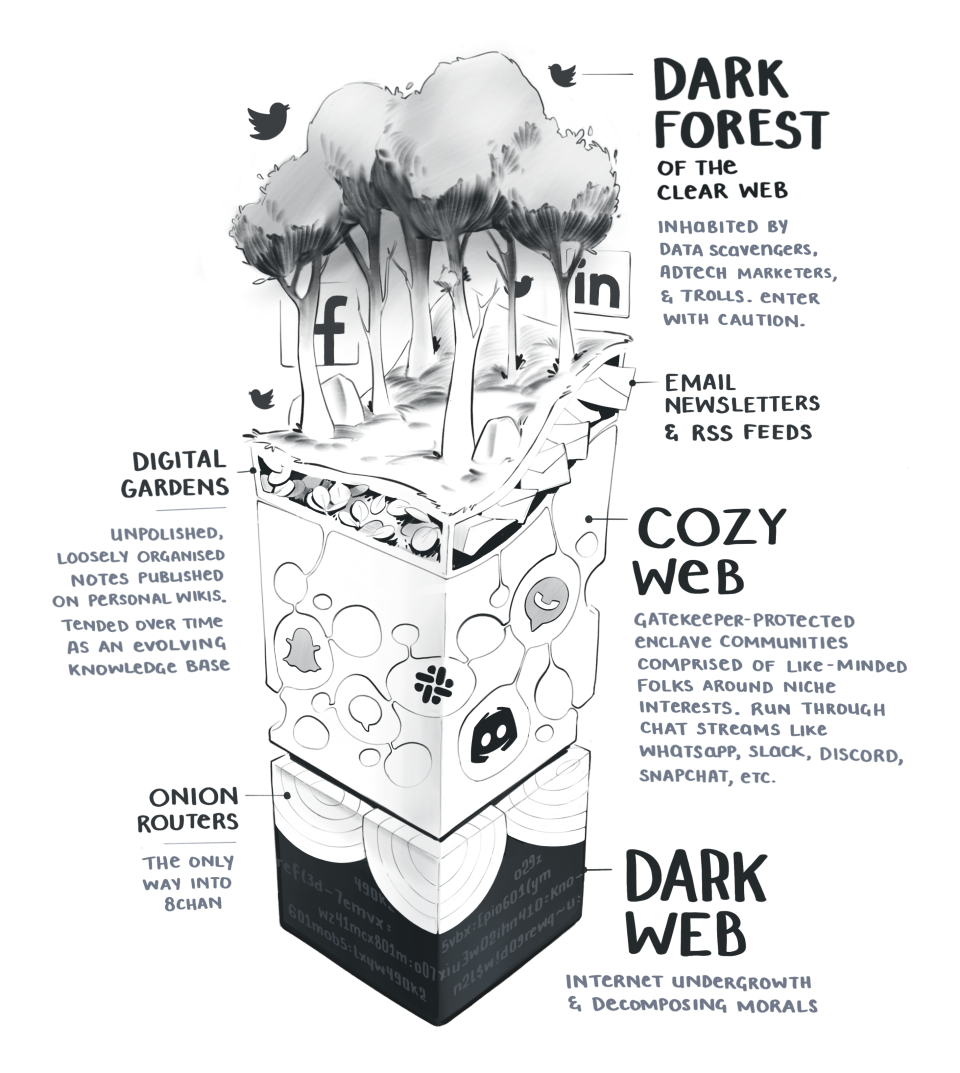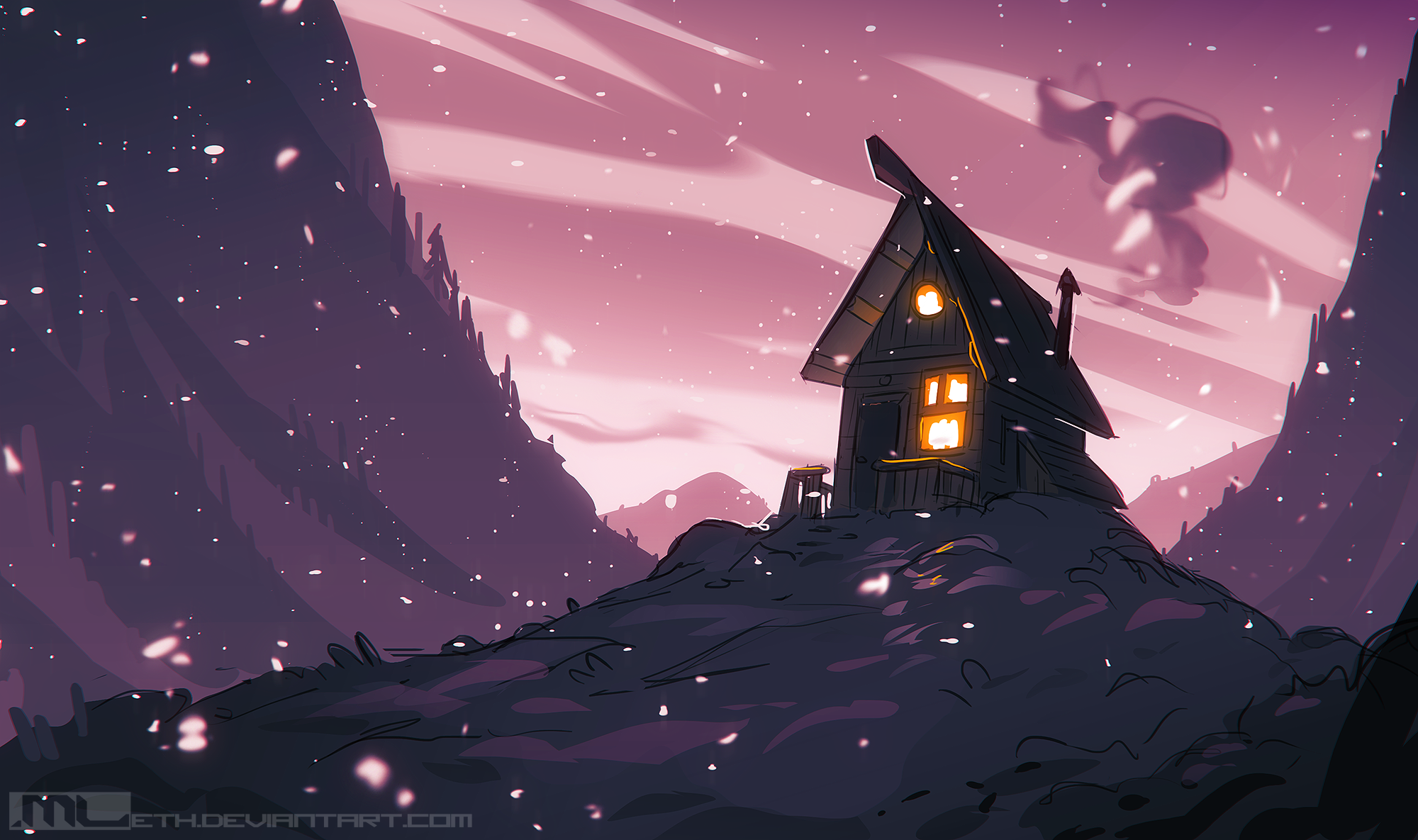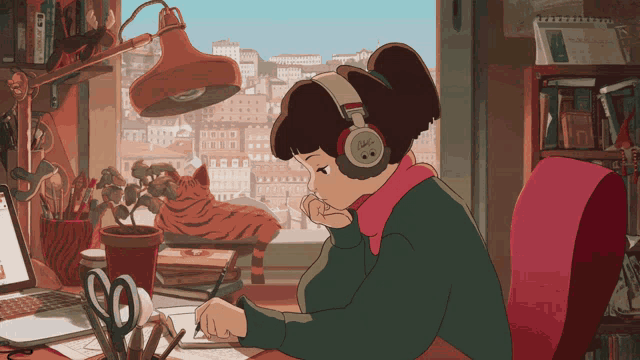Cozy Community Software
As Commune edges closer to an early-access release, I've been musing on the concept of the cozy web vibes that we intend to cultivate in our app.
Update: Commune has since been succeeded by Roomy.
Internet friends
My first foray into the cozyverse was IRC. Short for Internet Relay Chat, it's the precursor to the largely unchanged group chats we use today. And much like today's chatroom clients, IRC wasn't really part of the web, since it was accessed via the desktop app of your choice rather than the web browser. (Web clients did arrive towards the end of the IRC era). But it was an intrinsic part of web culture, and an exceedingly cozy one as such.
As a shy pre-teen looking for my place in a world I often found too loud and hectic for my gentle sensibilities, IRC presented a different way of being, with behavioral norms that were more forgiving of quirkiness. Cold-opening a conversation with “ASL?” (age, sex (gender), living (nationality)) was a socially acceptable way to start an interaction, though it was equally acceptable to decline to answer and maintain anonymity. Or just lie, and say you're a dog.
In a time when connectivity was at a premium, asynchronous communication was the norm. That was a blessing for someone like me who thought far too many group conversations in daily life resembled a blitz competition of who could get a word in before a topic had concluded, and the points for best quips and anecdotes would be tallied together to declare a Winner of Discourse. By the time a cogent thought had fully formed for the quiet ones, the conversation would have already moved on.
IRC made me fluent in conversational English at an early age, connecting me with a global network of geeks from all walks of life. It showed me how deep connections could be made with faceless human beings whom I only knew by their written word. It opened a window to new localities, where people were living radically different lives from the little bubble of privilege I knew. And the prevalence of 1:1 discussions encouraged common understanding as opposed to competitive debate. Figuring out who the person on the other end was – what they were like; the shape of their thinking – was the whole game.
In retrospect, IRC helped me understand how introversion vs extroversion is fundamentally contextual; coasting on the currents of the interwebs, I'm a social butterfly, striking up conversations with people in ways I can't even imagine in 'real life' without a severe spike in heart rate.
Retreating to the cozy web
In the words of Maggie Appleton, the cozy web is..
gatekeeper-protected enclave communities, comprised of like-minded folks around niche interests. Run through chat streams like WhatsApp, Slack, Discord, Snapchat etc.

The general thesis of Maggie's article and Venkatesh Rao's The Extended Internet Universe is that the cozy web offers a retreat away from the increasingly enshittified public web, overrun by marketing fluff, data scavengers, advertisements and divisive trolls.
Sadly, no mainstream space is safe from the trickle-down-turned-shitstorm effects of end times capitalism. Twitter and Reddit – where semblances of a cozy web appeared at the fringes – have long since begun their descent into rapid degredation, somehow failing to pay off their VC debts even after years of exploiting the free labor and data of their users.
Discord, carrying on the IRC legacy as a gargantuan network of group-chat safe havens, won't be safe for much longer; they've taken on a staggering $1 BILLION in VC funding. It's only a matter of time until they reach the user-hostile stage of the ruthless enshittification cycle that haunts every over-leveraged platform baron following the monopoly playbook. Not that it was ever that safe to begin with as far as your data is concerned.
Open source, community-owned software like Commune and friends offers a remedy to the deep rooted issues of opaqueness and stakeholder imbalance in closed-source software, but it is not innately cozy. That is an added quality resulting from an intentional design towards that specific end. My intention as a product thinker has been vaguely pointed in that direction ever since I digitally set foot in an IRC channel twenty years ago, but only recently has designing for coziness become my north star.
That journey has just begun, but I've arrived at some tentative answers that all seem to point to the same place of cozy communion where tea and low-fi tunes await.
Cozy community software is..
Safe – moderated; incremental
It's impossible to be in a state of coziness if you don't feel safe in your environment. Safe spaces require excellent moderation tooling that empowers its dwellers to self-govern through bottom-up advancements of responsibility.
Taking on moderation duties cannot be something you apply for like a job, it should be something you're organically entrusted by your peers to do more of over time, like an older sibling.
Safe spaces must also grow incrementally, without haste, lest they lose control of their innate culture. Growing by invitation is a time-tested way to scale up with care. Discord exemplifies this with its invite-only spaces, but an invitational community doesn't necessarily have to be quite that restricted. Invites can also be used as calls to action in working groups or topics as opposed to a grant to entry.
Accessible – discoverable; user-friendly
I'd like most of my collaborative spaces to be publicly viewable so that they're easily discoverable and openly available to vibe-checks. Lurkers can take their sweet time deciding whether to engage with us directly.
Coziness is also intrinsically linked to good UX. A deficient user experience feels cold and uninviting, like a poorly lit room in an unfamiliar place. Furthermore a baseline of usability is required to accommodate a true diversity of dwellers (i.e. regular folk who don't work with computers for a living). Monocultural, sterile places are the antithesis of cozy.
Casual – default asynchronous; at-your-leisure
Urgency is the cozy-killer. In most messaging software I’m frequently scared to mention someone at the wrong time, fearing they may not have a DND mode set and I’m gonna loudly ping them in the middle of the night.
This is one of Commune's key differentiators from Discord and the reigning status quo of comms tooling. Here's how we think it should work:
Upon sending a quiet-by-default mention, now the app may ask the mentioner if they want to boost this mention with additional forms of notification, to be sent now or later. Incremental Notifications.
Extol the virtues of fearless connectivity in a disruption-free environment.
Present – optionally synchronous; in-the-moment
While everything in a cozy place should be set up to work asynchronously, the option to connect with your peers in the present moment is an essential part of instilling a sense of belonging. Something special happens when we occupy both time and space together simultaneously.
Intimate – selectively private/public; closeness by consent
I'm deeply fascinated by a new breed of cozy places being constructed in the fediverse with software like Mastodon and Lemmy. See for instance tech.lgbt and beehaw.org.
Running on community software modeled after Twitter and Reddit respectively, there's an inevitable tension to these places as they use broadcast-oriented machinery for the making safe spaces. They have to be extraordinarily judicious in choosing which communities they federate theirs together with.
How to square that circle is an open question, but a lot of it fell into place for me when I read an excellent article by Anil Dash about consent-based search on the fediverse.
With consent built mindfully into the content workflow, what starts as a private conversation between two individuals can be moved into a shared spaced when the window of vulnerability has passed, and within those confines its suitability for fully public broadcast can be gauged by trusted peers.
A version of this is exemplified by my Musings on death and loneliness. It started as a chat message meant only for my immediate project collaborators, but I've since elevated its visibility to a blog post (requiring only the consent of one: my own) when I needed to refer to it in a subsequent blogpost, Against Loneliness.
This worked out exactly as I'd hoped when my exercise in vulnerability inspired a friend and project-partner to share his own piece of lived experience.
In summary:
- Safe – moderated; incremental
- Accessible – discoverable; user-friendly
- Casual – default asynchronous; at-your-leisure
- Present – optionally synchronous; in-the-moment
- Intimate – selectively private/public; closeness by consent
- what did I miss?
Available soon in a Commune near you...
🏕️

